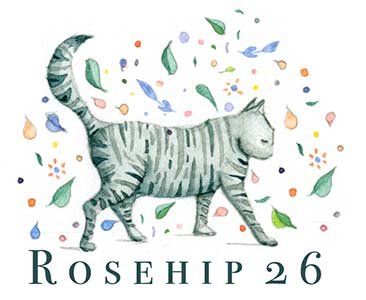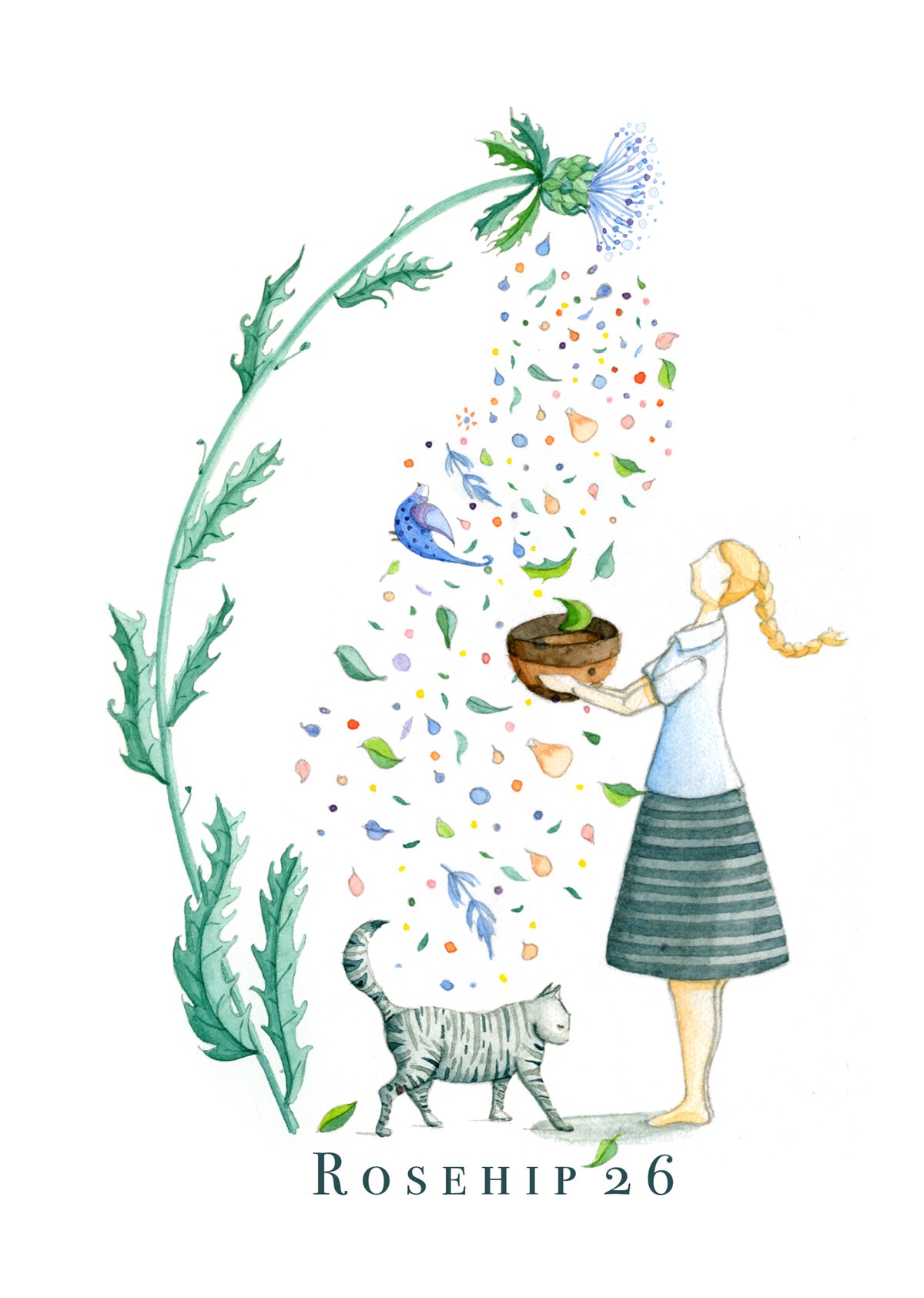Sweeping the Garden
Sweeping, sweeping, sweeping.
Artifacts of sweeping in the garden
Beloved Charlie
Mr. D. drops us at the Botanical Garden in Nevis, an island off of St. Kitts in the Caribbean, each morning at 8:45. Our task for the first hour is sweeping our designated areas. With a rake made of twigs, a dustpan fabricated from a cut-off plastic jug and a bin for collection, the team sweeps the lawn, as if it’s the kitchen floor. We sweep sticks, leaves and the occasional waste from Charlie, the garden dog.
Sweeping the garden.
Sweeping our selves.
Sweeping, sweeping, sweeping is a disciplined daily practice in cleansing the garden’s energies - and one’s own. Tending a garden tends one’s own personal garden. Literal sweeping is a spiritual sweeping. Movement, breath and mantra sweep out one’s personal dropped leaves, petals and twigs - a daily practice in releasing what’s finished - back to earth and beginning anew. Sweeping is a meditative rhythm, a choreographed movement of letting go.
Dancing in the garden.
Tending mother earth and her gifts is one of the greatest forms of seva, selfless service, there is. Tending her, preening her is an expression of love and adoration for our earth mother - and shows appreciation for all her gifts and blessings. The love for her builds our aura, furthering our strength and spiritual protection.
The gardener practices with a daily sweeping of the little things - the daily challenges of life - the little leaves are easily collected. But the experienced gardener doesn’t sweep debris under the rug - that just buries the energies. The gardener opens the door, opens the windows, moves, chants, breathes and sets it and themself free.
When daily sweeping has been in practice for some time, the gardener may feel they can sweep a little less or perhaps skip a day, sleep late. This may work for the short term but without the daily sweep, dense energies can weaken the warrior within, weighing it down. Many gardeners have to experience this to master the lesson.
Sweep the garden every day.
Sometimes the gardener self sabotages, kicking over the collected leaves in frustration or anger. The gardener may get in their own way, knocking over their bin, having to clean up their own mess. The toppled container of debris may overwhelm, leading to old, unhealthy coping strategies. If the gardener has been there before, they may be able to recognize it and seek support and simply pick up the spilled contents and continue with the practice. Others may fall and the leaves and debris accumulate, leaving them feeling buried. The gardener may lie on the ground, allowing the debris to cover them for a while and one day have a readiness to push themselves up through the pile, grab their tools and start the clean up. The debris may feel overwhelming at first but little by little, day by day, their strength increases and they know they will get there. With practice, the gardener recognizes when there is a weakness and prevents the fall but this takes discipline and experience. This is to be expected. Every gardener has witnessed falling behind in the sweeping - it’s part of the gardener’s maturity. It’s a lesson in growth and earned wisdom.
The gardener removes dead leaves and flowers from plants - dead-heading - literally removing what is dead but still connected to the living organism. They use care and protection - some of the leaves are sharp. Some of the leaves don’t want to let go - even when dried up and brown - holding onto past relationships, false beliefs and painful life experiences. The leaf may be dead but it can’t be forced to fall to the ground until it’s ready. The gardener patiently and gently tugs on the brown dried leaf until the day it releases its hold - it’s free, creating space for new growth, for transformation - a new cycle.
Sometimes a stronger hand comes in. When a storm hits, weakened branches and leaves break away from the powerful energy. While the gardener may not feel prepared for the storm and wants things to stay calm - a force greater than them takes it out of their hands. Tower moments - divorce, loss of a job, illness, political unrest, death of a loved one and extreme weather (in the literal sense!) may put the garden in disarray. Huge chunks fall onto the ground - with a loud crack and wump as gravity pulls it down. A stone wall crumbles, foundation cracking. The amount of debris in the pristine garden can be overwhelming. The gardener notices the landscape and takes stock of the debris. Recovery from the storm takes time, self-love and support - but transformation, growth and wisdom are always a result. Maybe there is a new view - a new path revealed - a path that wasn’t available before.
And when there is a very large branch or stone that needs to be cleared and it’s sitting there in the landscape? The gardener may work hard every day and it just won’t budge. They envision the garden pristine but it just isn’t. The wind is blowing, the leaves swirling around, the stone standing firmly in the mud. This is when the gardener loves themself the most. They learn about patience, going slow and they fall to the ground in prayer. They cry purifying tears, howl at the moon, scream in the darkness, cry some more, and keep sweeping the garden. The gardener may seek help. They may realize the strength in reaching out to another. And they accept that it will take a while. They learn that it’s okay to take all the time needed to clear the heavy stuff. The gardener sits with the heavy rock - and learns from the it. They study it’s cracks, ridges and feel it with their hands. They try to make sense of the rock. They may burden themselves by trying to understand why the rock fell into their garden and not someone elses. But one day they’ll stop trying to figure out why - and realize that the rock was a gift in a way that may not be understood until much later. And other times, they’ll never understand it and accept the mystery of life, and accept the rock in their landscape. Pale green lichen grows on it and it becomes their cat’s favorite napping spot - warmed by the sun. And, in time, they accept the rock - like a scar - part of the landscape now and they wouldn’t give it up for anything.
One day - the gardener feels lighter. The gardener’s eyes fill with tears of wonder - at the miracle of it all. They feel stronger, appreciative, flexible. They pick up their broom made of twigs, and start their morning sweep of little leaves and flower petals. The gardener enjoys the daily sweep. They sing. Sometimes they cry or talk to trees or smile at a butterfly. They accept whatever happens in their daily sweep. The gardener builds resilience. Builds a reserve. A reserve that is there for the gardener. There’s a strength inside that the gardener didn’t know about before — a strength developed in daily sweeping. When the next storm hits - they will know because they’ve been there before. The warrior is there and ready to step in, step up and stand firm.
Rest is important for the gardener. When the gardener is fatigued, they lean into a tree, talk to it, rest on the earth, drink water, eat fresh foods, smell the flowers and talk to the animals. Some gardeners may overdo the gardening. If the garden is maintained each day with discipline, there is plenty of time for everything else. More gardening doesn’t make one better or stronger - the daily sweep is what’s most important.
The gardener smiles at the leaves, sticks and weeds in the compost pile and celebrates. They give themself a squeeze, remembering it can take a life time of healing - there will always be petals, twigs and branches falling down into the landscape. And there will always be storms. And recovery from them.
The practicing gardener takes note of what and whom helped them move the debris - who was there in time of crisis? and who wasn’t? What supports were helpful and which were unhealthy? The gardener makes a list - learns the lessons - earns the wisdom and embodies the knowledge not only for the next storm but to mentor new gardeners.
The gardener is thankful for the days of sweeping petals and twigs - it may seem uneventful - but there is wisdom in maintaining the calm and building a reserve in the mundane.
Having experienced scary storms, the gardener doesn’t mind the uneventfull days - they start to understand what peace means.
And keep up with the daily sweeping -
welcoming new growth and allowing the dead leaves to fall away, when ready.
And giving thanks to earth mother - for all of it.
Today I’ll sweep the remaining delicate petals of heartache. I’ll sweep worry about the planet, greedy leadership and my children and feelings of danger from my gut. The crumbling rock of food for comfort used to block my path, but it’s smaller pieces give way. The pebbles will likely be part of the landscape in my lifetime and occasionally I’ll trip on them or stub my toe, but I know them. And I thank them for their past service. I don’t think they’ll block me anymore. And if they do? I have my warrior on the ready.
Sat nam - for truth. Love, Janet, a practicing and earth-mother-honoring gardener.



